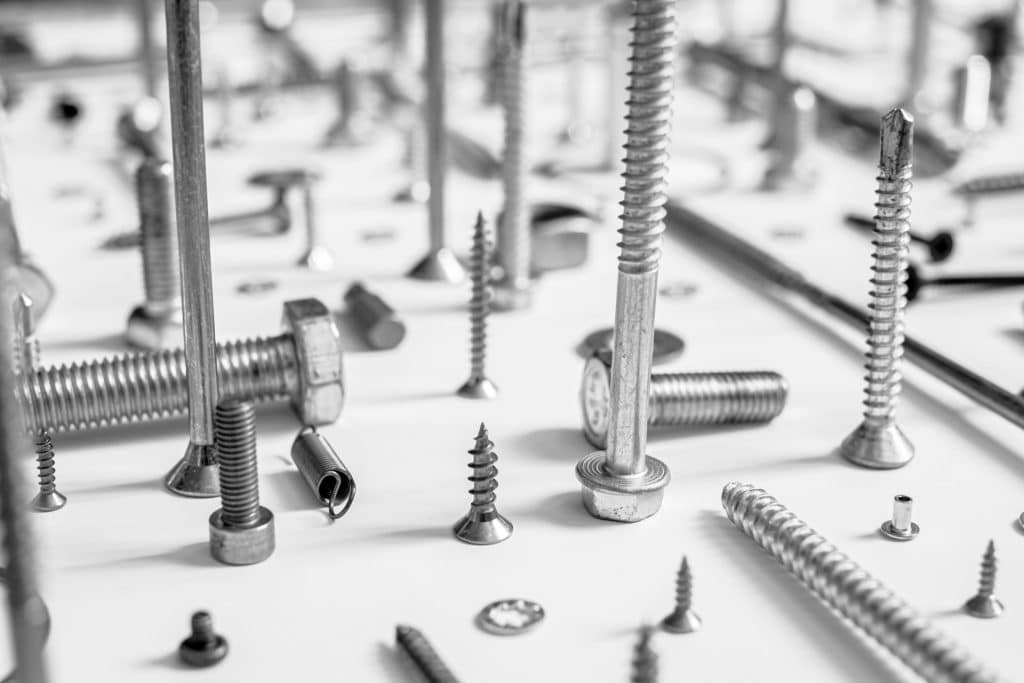If you’re working on a construction project, stability is key. Anchor bolts in concrete can provide the foundation necessary to ensure your project stays in place for years to come. But how do you set anchor bolts in concrete? It may seem like a daunting task, but with the right tools and techniques, it can be done quickly and easily.
Before you start, you’ll need to choose the right type of anchor bolt for your project. There are many types available, including wedge anchor bolts, sleeve anchor bolts, and drop-in anchor bolts. Each type has its own advantages and disadvantages, so it’s important to choose the one that’s right for your specific application. At Fastening Specialists, we carry a wide variety of anchor bolts from top brands like DeWalt, Powers, and Tie Max Pro, so you can be sure you’re getting the best product for your needs.
Understanding Anchor Bolts and Concrete
When it comes to setting anchor bolts in concrete, there are a few things you need to consider. Understanding the types of anchor bolts available and the properties of concrete will help you make the right choice for your project.
Types of Anchor Bolts
There are several types of anchor bolts available, including wedge anchors, sleeve anchors, and drop-in anchors. Each type has its own unique features and benefits, so it’s important to choose the right one for your specific application.
Wedge anchors are designed for use in solid concrete and can be used with a variety of materials, including steel and stainless steel. Sleeve anchors are ideal for use in brick, block, or concrete, and can also be used with a range of materials. Drop-in anchors are used in concrete and can be used with a variety of materials, including steel and stainless steel.
Concrete Properties and Considerations
When it comes to setting anchor bolts in concrete, it’s important to consider the properties of the concrete. The strength and composition of the concrete will affect the type of anchor bolt you choose and the installation process.
Concrete can be made with a variety of materials, including cement, sand, and aggregate. The properties of the concrete will depend on the materials used and the curing process. It’s important to ensure that the concrete is fully cured before installing anchor bolts.
When installing anchor bolts in concrete, it’s important to follow the manufacturer’s instructions and use the correct tools and equipment. Using the wrong equipment or installation process can result in the anchor bolt failing or the concrete cracking.
Fastening Specialists has been a trusted wholesale distributor for over 65 years and is the best option for all your fastening needs. With our expertise and experience, we can help you choose the right anchor bolt for your specific application. The team at Fastening Specialists provides advice and best use-cases, but always check with local building codes and engineers for correct usage instructions.
Tools and Materials Required
When it comes to setting anchor bolts in concrete, you will need a few essential tools and materials. In this section, we will discuss the tools and materials required, including safety equipment, drilling tools, and anchoring components.
Safety Equipment
Before you begin drilling and setting anchor bolts in concrete, it’s important to ensure that you have the necessary safety equipment. This includes safety glasses and gloves, which will protect your eyes and hands from any flying debris that may occur during drilling.
Drilling Tools
The primary tool you will need for drilling holes in concrete is a hammer drill. You can purchase or rent a hammer drill from hardware stores or online retailers. Additionally, you will need a masonry drill bit that is appropriate for the size of the anchor you plan to use. A wire brush or vacuum can be used to clear the drilled hole of any debris, dust, or concrete fragments.
Anchoring Components
Once you have drilled the holes, you will need to insert the anchor bolts. The type of anchor you use will depend on the application and load requirements. Threaded rod, nuts, and washers are commonly used to secure the anchor bolts in place. Anchoring epoxy can also be used to provide additional support and strength to the anchor.
At Fastening Specialists, we offer a wide range of high-quality anchor bolts and anchoring components from DeWalt fasteners, Powers fasteners, and Tie Max Pro fasteners. With over 65 years of experience as a trusted wholesale distributor, we are specialists in this field and can provide you with the best in product value, insight, code expertise, and order fulfillment.
Remember to always prioritize safety when setting anchor bolts in concrete. The team at Fastening Specialists provides advice and best use-cases, but always check with local building codes and engineers for correct usage instructions.
Preparation Steps Before Installation
Before installing anchor bolts in concrete, it is important to properly prepare the site to ensure a successful installation. This section outlines the necessary steps to prepare the site, including marking, measuring, and removing debris.
Site Preparation
The first step in preparing the site for anchor bolt installation is to ensure that the concrete surface is clean and free of debris. Use a broom or vacuum to remove any dust, dirt, or debris from the surface. If there are any large pieces of debris, remove them by hand or with a shovel.
Next, use a marker, pencil, or marker to mark the location of the anchor bolts on the concrete surface. Make sure the marks are visible and accurate. If you are installing anchor bolts in a grid pattern, use a measuring tape to ensure that the bolts are spaced evenly.
Marking and Measuring
Once you have marked the location of the anchor bolts, use a measuring tape to determine the depth of the holes that need to be drilled. The depth of the holes should be at least as deep as the length of the anchor bolts, plus an additional inch or two for clearance.
After measuring the depth of the holes, use a hammer drill and the appropriate masonry bit to drill the holes. Be sure to drill the holes straight and at the correct depth. Once the holes are drilled, use a wire brush or compressed air to remove any debris or dust from the holes.
It is important to note that the type of anchor bolt used will depend on the application and load requirements. For example, DeWalt fasteners, Powers fasteners, and Tie Max Pro fasteners are all popular options for concrete anchor bolts. Fastening Specialists is a trusted wholesale distributor for over 65 years, and we can help you choose the right anchor bolt for your specific needs.
Remember to always check with local building codes and engineers for correct usage instructions. The team at Fastening Specialists provides advice and best use-cases.
Installing Anchor Bolts in Concrete
If you’re planning to install something heavy on concrete, you will need to use anchor bolts to secure it in place. Anchor bolts are threaded rods that are embedded in concrete and used to attach structures or objects to the concrete surface.
Drilling the Hole
The first step in installing anchor bolts is to drill the hole in the concrete. You will need a hammer drill with a masonry bit to make the hole. The size of the hole will depend on the size of the anchor bolt you are using. Make sure the hole is drilled perpendicular to the concrete surface to ensure the anchor bolt is straight.
Inserting and Securing the Anchor
Once the hole is drilled, clean it out with compressed air or a vacuum to remove any debris. Then, insert the anchor bolt into the hole and tighten the nut until it is flush with the surface of the concrete. Make sure the anchor bolt is inserted straight and not at an angle.
Final Checks and Cleanup
Before the concrete dries, double-check that the anchor bolt is straight and in the correct position. Once the concrete has dried, you can tighten the nut to secure the object you are anchoring. If you need additional peace of mind, you can use anchoring epoxy to secure the anchor bolt in place.
As a trusted wholesale distributor for over 65 years, Fastening Specialists can provide you with the best in product value, insight, code expertise, and order fulfillment. We are specialists in this field, and we know that fastenings can be overwhelming. That’s why we are here to help you with precision and efficiency.
Remember to always check with local building codes and engineers for correct usage instructions. The team at Fastening Specialists provides advice and best use-cases, so you can trust us for all your fastening needs.
Post-Installation Considerations
Once you have successfully installed your anchor bolts in concrete, there are a few important post-installation considerations to keep in mind to ensure the safety and longevity of your structure.
Fixture Attachment
When attaching fixtures to your concrete walls or floors, it is important to ensure that the fixture is securely fastened to the anchor bolt. This will prevent any unnecessary movement or vibration that could compromise the structural integrity of the fixture or the concrete. Make sure to follow the manufacturer’s instructions for the fixture and use the appropriate type of fastener. DeWalt fasteners, Powers fasteners, and Tie Max Pro fasteners are all great options to consider.
Heavy Machinery Support
If you are using anchor bolts to support heavy machinery, it is important to make sure that the anchor bolts are installed correctly and can withstand the weight of the machinery. It is also important to consider the type of machinery and the vibration it may produce. Make sure to use anchor bolts that are specifically designed for heavy machinery support and follow the manufacturer’s instructions. Fastening Specialists is a trusted wholesale distributor for over 65 years that can provide you with the best options for your needs.
Structural Integrity
Anchor bolts play a crucial role in the structural integrity of your concrete structure. It is important to make sure that the anchor bolts are installed correctly and are able to withstand any potential stress or movement. Regular inspections of the anchor bolts and the surrounding concrete can help identify any potential issues before they become major problems.
Movement and Vibration
If your structure is subject to movement or vibration, it is important to consider the type of anchor bolt you use. Some anchor bolts are designed to withstand movement and vibration better than others. Make sure to use anchor bolts that are specifically designed for your needs and follow the manufacturer’s instructions.
Remember, Fastening Specialists provides advice and best use-cases, but always check with local building codes and engineers for correct usage instructions. With over 65 years of experience, Fastening Specialists is a trusted wholesale distributor that can provide you with the best options for your fastening needs.

